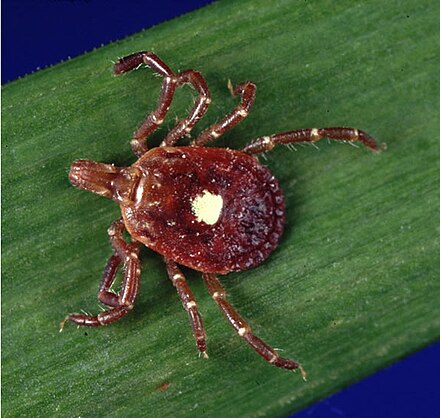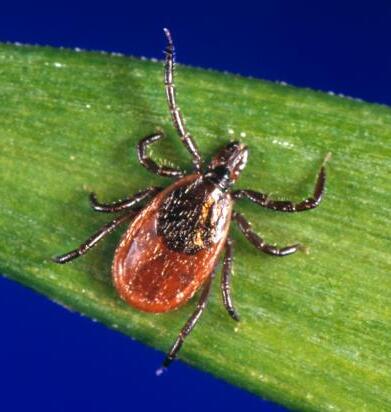Ehrlichiosis
Ehrlichiosis is a tick-borne bacterial infection caused by bacteria of the family Anaplasmataceae, specifically in the genera Ehrlichia and Anaplasma. These bacteria infect and kill white blood cells, leading to a spectrum of symptoms and potentially severe complications. The average annual incidence is approximately 2.3 cases per million people.

Types
Six species have been identified to cause human infection:
- Anaplasma phagocytophilum: causes Human granulocytic anaplasmosis, endemic to New England, north-central, and Pacific regions of the U.S.
- Ehrlichia ewingii: causes human ewingii ehrlichiosis, prevalent in south-central and southeastern states.
- Ehrlichia chaffeensis: causes human monocytic ehrlichiosis, also common in south-central and southeastern states.
- Ehrlichia canis
- Neorickettsia sennetsu
- Ehrlichia muris eauclairensis

Ehrlichia muris eauclairensis was recently discovered and has low reporting numbers due to its novelty and symptom similarity to other Ehrlichia bacteria. In 2011, a new Ehrlichia species was reported in Minnesota and Wisconsin, carried by deer ticks, causing flu-like symptoms. This new species is genetically similar to E. muris found in Eastern Europe and Japan.
Signs and Symptoms in Humans
Ehrlichiosis presents with a range of symptoms:
- Common: fever, chills, severe headaches, muscle aches, nausea, vomiting, diarrhoea, loss of appetite, confusion, and a splotchy or pinpoint rash.
- Severe: brain or nervous system damage, respiratory failure, uncontrollable bleeding, organ failure, and death.
The disease can suppress the immune system by reducing TNF-alpha production, leading to opportunistic infections. Severe cases may show a "toxic shock-like" syndrome, sometimes with purpura. Approximately 3% of human monocytic ehrlichiosis cases result in death, particularly in immunosuppressed individuals.
Diagnosis
Diagnosis of ehrlichiosis is typically based on clinical presentation and a history of tick exposure, supported by laboratory tests. Blood tests may show low white blood cell and platelet counts, elevated liver enzymes, and presence of the bacteria in blood smears or PCR assays.
Treatment
The first-line treatment for ehrlichiosis is doxycycline or minocycline. For those allergic to tetracyclines, rifampin is an alternative. Early clinical experiences suggested chloramphenicol might be effective, but in vitro tests revealed resistance.
Prevention
No human vaccine is available for ehrlichiosis. Prevention primarily involves tick control:
- Avoiding tall grassy areas
- Treating clothes and gear with tick repellents
- Using EPA-approved bug repellent
- Conducting thorough tick checks on people, animals, and gear
- Showering soon after potential tick exposure
For dogs, products like Advantix®, Frontline Plus®, Vectra 3D®, Bravecto®, Nexgard®, Simparica®, Credelio®, or Bravecto® are recommended for tick prevention.
Epidemiology
Ehrlichiosis is a nationally notifiable disease in the U.S., with cases reported year-round, peaking from April to September. The disease is most common in the southeastern and south-central U.S. Since its first reported case in 2000, the number of cases has increased significantly, from 200 in 2000 to 2,093 in 2019. The incidence is higher in older age groups, with the highest fatality rates observed in children under 10 and adults over 70. Immunosuppressed individuals have a higher risk of death.
Self-assessment MCQs (single best answer)
What family of bacteria causes Ehrlichiosis?
Which tick is characterised by a white dot on its back and can spread Ehrlichiosis?
Which species causes human granulocytic anaplasmosis?
What is a common symptom of Ehrlichiosis?
Which species was recently discovered and causes symptoms similar to other Ehrlichia bacteria?
What is the first-line treatment for Ehrlichiosis?
Which of the following is not a severe symptom of Ehrlichiosis?
What should you do to prevent Ehrlichiosis?
Which demographic has the highest fatality rate for Ehrlichiosis?
In what period do Ehrlichiosis cases peak in the U.S.?
Dentaljuce
Dentaljuce provides Enhanced Continuing Professional Development (CPD) with GDC-approved Certificates for dental professionals worldwide.
Founded in 2009 by the award-winning Masters team from the School of Dentistry at the University of Birmingham, Dentaljuce has established itself as the leading platform for online CPD.
With over 100 high-quality online courses available for a single annual membership fee, Dentaljuce offers comprehensive e-learning designed for busy dental professionals.
The courses cover a complete range of topics, from clinical skills to patient communication, and are suitable for dentists, nurses, hygienists, therapists, students, and practice managers.
Dentaljuce features Dr. Aiden, a dentally trained AI-powered personal tutor available 24/7 to assist with queries and provide guidance through complex topics, enhancing the learning experience.
Check out our range of courses, or sign up now!


